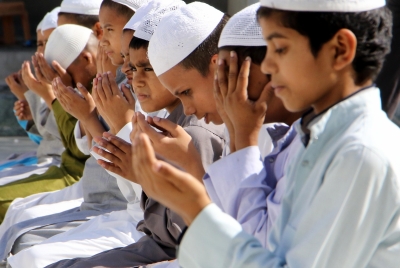<p class="p1">No running around in the market to buy animals for sacrifice, no need to scout for the butcher for slaughter and no worries about keeping the place clean in these times of Covid-19.</p>
<p class="p1">This Eid-ul-Adha will be different for the Muslims in Hyderabad and other parts of Telangana as most of them will be offering the sacrifice while sitting at their homes.</p>
<p class="p1">They are outsourcing the work to the cattle traders and other groups, who not only buy the sheep, goats or cattle for them but also slaughter the animals and deliver the meat at their doorsteps or distribute it among the poor and needy as per their wish.</p>
<p class="p1">Scheduled to be celebrated on August 1, Eid-ul-Adha, also known as Bakrid, will see a departure from the past in many ways. The Covid-19 has changed the way the festival of sacrifice is celebrated.</p>
<p class="p1">As the virus spread continues in the state with Hyderabad remained the hotspot, the majority of Muslims are availing of the services offered by traders, NGOs, socio-religious organizations, and some Islamic seminaries.</p>
<p class="p1">With safety uppermost in their minds, most people are avoiding going out to buy the animal or perform the sacrifice at home. They don't want to take the risk of going into a gathering or calling a butcher to slaughter the animal.</p>
<p class="p1">Every year, hundreds of traders bring hordes of sheep or goats from various districts to Hyderabad and set up their temporary stalls. This time, a majority of traders have taken their business online by sending pictures and videos of the animals to the prospective buyers on their smartphones and offering online payment options.</p>
<p class="p1">Majority of the people sacrificing animals every year hire the services of butchers who come to Hyderabad from different districts in the state. This time, the fear of COVID-19 has led many to drop their plans.</p>
<p class="p1">Instead of sacrificing the animals on their own, they are outsourcing the entire job to the traders and organizations.</p>
<p class="p1">These groups make the arrangements of 'ijtemai qurbani' or collective sacrifice every year but it was for those taking 'hissa' or share in a cattle.</p>
<p class="p1">Seven persons can join in the sacrifice of a big animal while a sheep or goat can be sacrificed by an individual. Several groups and individuals every year organize collective sacrifice.</p>
<p class="p1">This year, they are not just handling sacrifice of cattle but also making arrangements for the slaughter of sheep or goats.</p>
<p class="p1">Farooq Ahmed, a social worker in Toli Chowki area who arranges 'ijtemai qurbani' every year, told IANS that this time his group has tied up with various others, including professional butchers, to cater to those who take 'hissa' in cattle or those who want to sacrifice sheep or goats.</p>
<p class="p1">Each 'hissa' this year costs Rs 3,400, up from Rs 3,000 last year, as the prices of cattle have gone up by 30 to 40 per cent.</p>
<p class="p1">For those who want to offer sheep for sacrifice, he is charging Rs 400 per kg (live sheep). The price last year was Rs 360 per kg.</p>
<p class="p1">"All one has to do is to contact us and make payments. If somebody wants a 22-kg sheep, we charge Rs 10,000, including Rs 1,000 for slaughter and cutting the meat. We do home delivery of the meat," said Farooq.</p>
<p class="p1">"We want to help those who are looking for such a service in this crisis," said Farooq, who is associated with Jamaat-e-Islami.</p>
<p class="p1">People were initially confused and clueless as some seminaries, including Hyderabad's Jamia Nizamia, had issued 'fatwa' that those who can't sacrifice the animal for some reason can donate the equivalent money to the poor.</p>
<p class="p1">However, with top clerics making it clear that charity can't be a substitute to sacrifice, people are now exploring all options to perform the sacrifice.</p>
<p class="p1">Eminent religious scholar and All India Muslim Personal Law Board Secretary Maulana Khalid Saifullah Rahmani clarified last week that making sacrifice is obligatory as per Sharia and not doing it despite having the wherewithal is sinful.</p>
<p class="p1">"While those who said that money can be donated in lieu of sacrifice have no ill-intention, they have not understood the significance of sacrifice," he said.</p>
<p class="p1">Clerics point out that the three-day festival is an occasion to commemorate the great sacrifice of Prophet Ibrahim, who offered to sacrifice his son Prophet Ismail on Allah's command. The Almighty replaced Ismail with a lamb just as Prophet Ibrahim was about to slit his son's throat.</p>
<p class="p1">"It's an occasion to remember the great sacrifice and pledge ourselves to be ready to make any sacrifice in the way of Allah," said senior citizen Ishtiaq Ahmed.</p>
<p class="p1">He pointed out that with many individuals and organizations with service motto coming forward to offer their services, people are now gaining confidence. Such individuals and organizations have also joined hands with professional butchers, preferably those who have undergone Covid-19 tests.</p>
<p class="p1">Making the sacrifice is obligatory for adult Muslims who possess a wealth equivalent of 87.48 gm gold or 612.35 gm silver.</p>
<p class="p1">The meat of the sacrificed animal is distributed equally in three parts. The person making the sacrifice keeps one part for his family, while the other two parts are distributed among the relatives and the poor.</p>
<p class="p1">There are many affluent families who have also entrusted them with the task of distributing the meat among the poor and needy in the city or in rural areas.</p>
<p class="p1">This year the number of such families has gone up as the distribution of meat even among relatives and friends is a challenge due to Covid-19 situation.</p>.




















